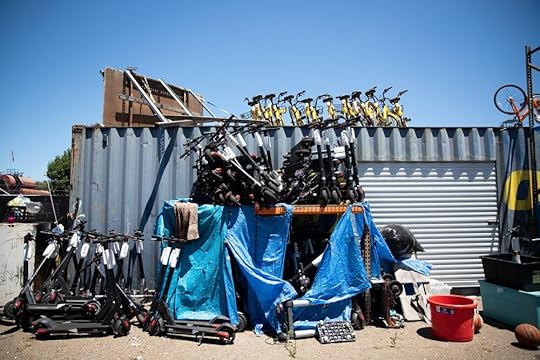Cara Natterson's Blog, page 11
October 21, 2019
When Kids Have Big Questions

Last month, when Greta Thunberg traveled to the US and spoke at the United Nations, she called out the adults of the world. She was very clear that the narrative we have placed on our kids – that they need to save the earth, these are their answers to seek – is grossly unfair. Backwards even. She argued passionately that everyone needs to take steps in the right direction and begin to make change. And she’s…READ MORE
October 20, 2019
Therapeutic Laughter

Comedian meets mom meets social change agent. That’s Dani Klein Modisett. We’ve been friends for many years, and during that entire time she has made me laugh. But now, she’s inspiring me, too. You’ll see why – just read on.
CN: Dani Klein Modisett, who are you?
DKM: I’m a…READ MORE
September 12, 2019
Vape Mayhem

I literally do not know how to keep you up with all of the recent head-spinning news about vaping. For the past couple of years, I have been a broken record of warnings on this topic. Oh how I wish I had been wrong. Because there’s so much we all need to wrap our brains around at the moment, the biggest article in…READ MORE
September 11, 2019
From Childhood to Wildhood

Barbara Natterson-Horowitz is a physician, evolutionary biologist, and Harvard professor who has developed a species-spanning approach to understanding health and development. She just returned from the 2019 Nobel Conference in Stockholm where her research was featured and she... READ MORE
September 10, 2019
When Kids Want News

I have discovered an amazing news outlet designed just for kids: a non-partisan, 5-minute daily news podcast created by four journalists-turned-moms. A source of solid, not to mention topical - information for our kids to consume directly sounds too good to be true, right? It shouldn’t, argue these writing... READ MORE
September 9, 2019
Scooter Bounty Hunters
Ever feel like you want to take matters into your own hands? When something is going slightly off the rails - evolving from a nuisance to a pet peeve to a serious headache or even a danger - and no one is doing a darned thing about it? Well take a lesson from Dan Borelli and John Heinkel.
These guys were fed up with electric scooters clogging sidewalks and cluttering private property. So they innovated by forming ScootScoop, a company that collects and impounds the illegally strewn vehicles, charging Bird, Lime and other scooter companies a pretty penny for retrieval. Naturally, they are being sued and they are doing some counter-suing themselves. But none of that seems unanticipated.
ScootScoop doesn’t solve all of the safety issues related to electric scooter invasions. But it does address one major swath: the clutter that turns a nice walk down the street into an obstacle course. So I say kudos to you guys! Wondering if businesses like theirs will multiply as quickly as the scooters themselves...

The first thing you notice in San Diego’s historic Gaslamp Quarter is not the brick sidewalks, the rows of bars and the roving gaggles of bachelorette parties and conferencegoers, or even the actual gas lamps.It’s the electric rental scooters. Hundreds are scattered around the sidewalks, clustered in newly painted corrals on the street and piled up in the gutters. In early July, one corner alone had...READ MORE
September 8, 2019
Ride Sharing
Ride sharing, like R-rated movies, is not meant for kids without an adult present. Or at least without an adult involved somewhere in the transaction. Who knew?
Not me, and I know a bit about ride-share, given that I have worked with Zemcar, a Boston-based ride-share company dedicated to safe and secure child transportation. Still, in my hometown of Los Angeles, I can no longer count the number of times kids arrive at or leave from my house in Lyfts and Ubers. Yes, they do it with their parents’ knowledge (and permission), and most of them have a pretty sophisticated safety system in place that involves snapping a picture of the car’s license plate and then one of the driver in a way that the driver can see the picture is being taken. The girls in particular tell me that they text the images to a parent, dictating a text message about getting into the car and sharing the car and driver info, spoken loudly so that the driver can hear.
This piece from Vox takes a deep dive into ride sharing for kids. It honors the transportation realities we all face, while also pointing out the legalities of this business. I found it pretty compelling, mostly because it opened up several threads of conversation with my kids about my comfort with any and all of this. As parents, we are all going to make our own safety calls. If you are on the fence about ride-share, this article may help you figure out your own comfort zone while suspending judgment of others.

Richard Tran lives with his aunt a mile and a half away from his high school in the suburbs of Orange County, California. That means it’s about a 30-minute walk away, but as a teenager, he doesn’t have a half hour to waste lugging home a heavy backpack. Those 30 minutes could be used for homework or video games, a quick nap or a solid scroll through social media.It occurred to Tran one afternoon that, instead of walking, he could call an…READ MORE
August 14, 2019
No Breakfast, No Problem?
Whose kids don’t eat breakfast? I have one of those. Or rather, I have one who would like to be counted among the ranks of the no-food-past-my-lips-while-I’m-still-half-asleep, but I deny her the opportunity.
That’s because in medical school and in the medical literature — all over the press actually — there’s a strong conviction that breakfast is the most important meal of the day. I spent years in my practice negotiating with (okay, sometimes begging) teenagers to just get a few bites across their lips before they walked out the door. Or at the very least a couple of sips of a smoothie, ideally with protein. I was a broken record.
Over the past several years, though, there’s emerging data that long periods of fasting are actually good for you. Really good. Life extending, weight changing good for you. Basically, you can skip breakfast or you can skip dinner (but not both!) and your body will thank you. This article summarizes the research that exists for adults and it got me thinking: should we be changing what we preach to our teens? Are the morning food-refusers actually onto something? I don’t know of any research that has looked at this population in particular (if you do, please share), but I will say that based upon everything I have read recently, I am thinking about running an experiment of my own in this new school year. I might just lay off the insistence that breakfast gets consumed and see how my daughter feels in that first class of the day, honoring her internal clock, which is apparently trying to dictate a prolonged daily fast. I will let you know how it goes.

Fasting is one of the biggest weight-loss trends to arise in recent years. Endorsed by A-list celebrities and the subject of a spate of best-selling books, it was the eighth most-Googled diet in America in 2018.But fasting shouldn’t be dismissed as just another fad. At the Charité University Hospital in Berlin, I’ve employed what’s called intermittent fasting, or time-restricted eating, to help patients with an array of chronic… READ MORE
August 13, 2019
The Talk, 2019 Style

At this point in my career, I would say the most common questions I get are about The Talk. When should you start explaining the birds and the bees? How much? How in-depth? How??? One answer may be: watch this. Because The Talk we all got back in our day just doesn’t cut it anymore.
August 12, 2019
Sexting Grown Up
A few weeks ago, a new study about teen sexting made headlines by concluding that only one out of every five teens sext. I’ll be honest: I didn’t buy their conclusions. I fully believe that in their study, only 20% of the kids they asked admitted to the behavior (even though in any informal survey I have ever taken when teaching kids or interviewing them for a project, my number would be far closer to 80%), but the conclusion seemed to be that we don’t need to worry about the issue because it’s much smaller scale than we think. What’s my beef? That regardless of whose numbers are correct, when we were kids, we never had to think about seeing Jimmy from math class in the buff.
When I teach sixth graders, I ask them the following questions: Has anyone ever asked you or someone you know for a nude? Have you or someone you know ever received one? And I swear, 100% of the hands go up. When I drill down, it’s really that they know someone who has been solicited or on the receiving end — they themselves haven’t necessarily been asked. But still, the numbers of someone who knows someone at age 11 or 12 are impressive.
I felt somewhat vindicated when I found this article, albeit years old, making the case for nudes and sexts as common currency among adults. We know this by now, right? That our adult friends are engaging in nude swapping as often as our kids? Especially our single friends on dating sites. Don’t believe me? Go ask them and they will tell you about the currency of naked pictures, sometimes wanted but oftentimes not. When this particular article was written back in 2015, a survey of 18 - 82 year olds reported that a whopping 88% of them were part of sexting culture.
My point here is that naked image swapping is common — more common among our kids than we want to believe and more common among adults than we often acknowledge. So instead of debating whether its happening, let’s figure out how to talk about it: how to prepare our kids for what they are going to see; how to say no if they don’t want to participate; what are the legal ramifications if they do; and what can happen to reputations when images get passed around. At any age.

Parents of budding teens can breathe a little easier: A new study says adolescent "sexting" is not an epidemic.On the other hand, it's not disappearing, either, despite campaigns to curb it."Sexting is perceived as an epidemic because the news highlights extreme cases that involve tragic outcomes, and because it goes against standards of morality and decency that are historically entrenched," said study author Sameer Hinduja, a professor of criminology at Florida Atlantic University. READ MORE



